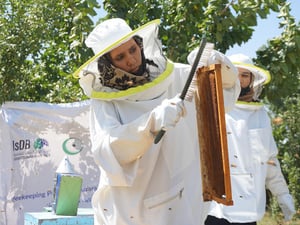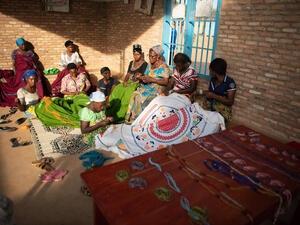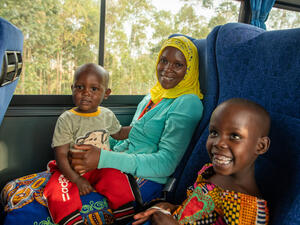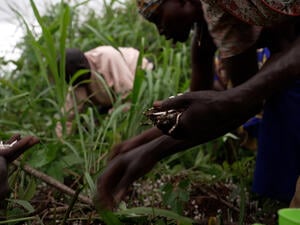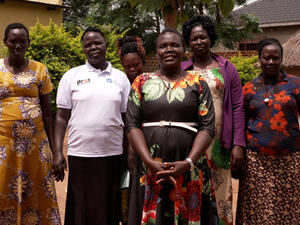For Sri Lanka's displaced, help in returning home
For Sri Lanka's displaced, help in returning home

Alaguratnam Ravindran and his wife, Yumanaran, in their rice paddy, which is due to be harvested next month.
MORAWEWA, Sri Lanka, September 4 (UNHCR) - Alaguratnam Ravindran was just three years old when his family fled their small farm in eastern Sri Lanka in the wake of the country's decades-long conflict. Twenty seven years later, married and with a child of his own, he has returned home, and with the assistance of the UN refugee agency, is preparing to harvest his first rice crop.
In the six months since Ravindram, his wife and their three year old daughter returned he has been helped by UNHCR, its partners, and local authorities to resume his life as farmer, which had sustained him during the long years of displacement in the Vavuniya and Trincomalee districts of Sri Lanka.
"Under the return programme we got an acre of land for building a house and setting up a backyard garden and we also received three acres paddy field to cultivate rice," said Ravindran.
Ravindran also reeceived tools and seeds through UNHCR's Quick Impact Project programme, which aims to help those displaced through livelihood opportunities and upgrading basic services in return areas of Sri Lanka.
UNHCR, with its partners, is steadily working to identify interventions that could help in making returns more sustainable as more people return home in Sri Lanka after thirty years of war.
"The projects allow us to stabilize the return of those people who were displaced and to build confidence between the communities in the villages of return," said Laurent Raguin, Senior Programme Officer for UNHCR in Colombo, the Sri Lankan capital. "We have implemented some 231 projects over a two year period in areas such as education, water and sanitation, livelihood activities, and other basic areas."
UNHCR and its partners have supported projects in nine districts of Sri Lanka's north, east and south western districts including Jaffna, Kilinochchi, Trincomalee, Vavuniya, Puttalam, Batticaloa, Ampara, Mannar and Anuradhapura. Projects have a maximum expenditure of US$ 30,000 and are selected by district and national level steering committees.
"In 2009 more projects are being implemented. Recommendations for small projects come from field offices that directly deal with returnees and host communities in the country. The committees have representation from government ministries, humanitarian agencies and UNHCR," said Raguin.
Surveying his lush, green plot of land, Ravindram is emphatic about the impact of the assistance he has received. "I feel like I have been given back my life," he said. "Next month our rice crop will be ready and should give me some 35,000 Rupees (US$ 310). Next season I should be able to buy my own seeds."
For the first six months following their return, formerly displaced families are provided with non-food supplies by UNHCR and food rations by the World Food Programme to assist with their re-integration.
Johar Raja, another returnee to the area and head of the local farmers' association, said that the small projects had had a positive impact on the community. "Returnees are so eager to work and re-establish themselves in their places of origin. Follow-up visits by UNHCR and its partners give us more confidence that we are being cared for and the small projects are paying dividend and have given more hope," he said.
More than 500,000 people are displaced in Sri Lanka today due to the three decade long conflict. The displaced population includes some 280,000 that fled this year at the end of the war.
By Babar Baloch
In Morawewa, Sri Lanka

